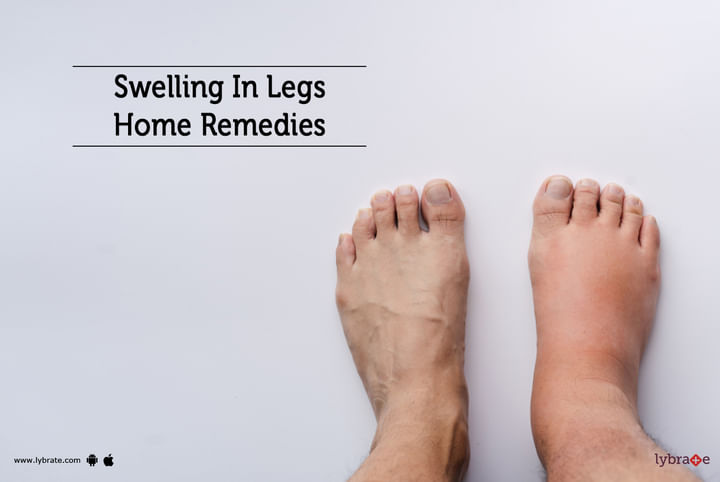Swelling In Legs Home Remedies
Edema, or swelling in the legs, can be a real pain—quite literally. It hits you when there is an abnormal accumulation of fluid in the interstitial spaces of your body, which are the tissues between your cells. This can happen for a variety of reasons, most often related to being pregnant, taking certain medications, being immobile for prolonged periods of time, or having certain health conditions such as congestive heart failure or liver disease.
There are mainly a couple of kinds of this condition, which are commonly referred to as 'pitting edema' and 'non-pitting edema.' Pitting edema is when you press on the swollen area and an indentation forms that stays there for a while after you release the pressure. Non-pitting edema, on the contrary, does not form any indentations.
Both of these types can be treated with elevation, compression socks or stockings, and diuretics. Apart from these, if you are looking for different home remedies to help alleviate symptoms of edema or swelling in the legs, here are some great options to explore:
Stay Hydrated (drink plenty of healthy fluids)
When you are not drinking enough water (or healthy fluids) or keeping yourself deprived of it, your body will hold onto what it already has instead of flushing it out through urine or sweat. This can result in swelling, and this process can also be referred to as 'water retention.' So, if you want to get rid of edema or swelling in the legs, you should consider drinking at least eight glasses of water every day without fail.
Apart from keeping your body hydrated, it's generally a good idea to avoid alcohol, especially when you are suffering from a condition like edema. Alcohol causes dehydration because it forces the body to expel fluids from the blood at a much quicker rate than other liquids. When this happens, the body is unable to rehydrate itself as quickly, leading to a state of dehydration.
Try Shedding Those Extra Pounds
Most of us are aware of the fact that being overweight can reduce blood circulation. Speaking of poor blood circulation, it can give rise to swelling in the lower extremities of a person, including in their legs and feet.
Being overweight doesn't just put strain on your feet; it can also lead to foot pain when walking and cause you to be more sedentary as a result. This, in turn, can cause fluid to build up in your feet.
Losing weight can help reduce the amount of pressure on your feet and possibly reduce any foot swelling that you may have. Furthermore, you must speak with your doctor about whether you need to lose weight and how to go about doing so in a healthy way. They may provide you with the best guidance and advice!
Consume More Potassium-Rich Foods
If you find that you have swelling in your legs or feet, it might be a good idea to increase your intake of potassium-rich foods. Potassium plays an important role in keeping our blood pressure at a healthy level and preventing water retention, which can cause swelling in our legs.
If you have no dietary restrictions, consider incorporating foods that are rich sources of potassium into your diet. Some potassium-rich foods include:
- Bananas
- Oranges
- White beans
- Tomatoes
- Pistachios
- Sweet Potatoes
- Spinach
- Salmon
- Beans
- Milk
There are other sources of potassium you can try besides those listed above. For example, you could drink orange juice or low-fat milk instead of soda. However, if you have any medical conditions, especially kidney issues, it's important to talk with your doctor before increasing your potassium intake.
Soak Legs (or feet) in a Salt Bath
Epsom salt is often used as a home remedy for edema, water retention, or swelling in the legs. When used correctly, Epsom salt can not only help reduce inflammation but also improve blood circulation.
Salt is an effective treatment for swelling of the legs because it osmotically pulls water out of cells to reduce tissue congestion and inflammation. In fact, salt has been used as a home remedy for swelling of the legs and various other conditions for centuries. Additionally, the minerals in salt help to soothe and relax muscles.
For a refreshing and rejuvenating salt bath, first of all, dissolve a cup of Epsom salt in a tub of lukewarm water. Then, soak your legs in the water for at least half an hour (or as long as you feel comfortable) to enjoy its real benefits.
Exercise Can Do Wonders for You
Exercise is key to warding off edema, or swelling in the legs. By keeping your muscles active, you help promote blood flow throughout the body, which is essential in preventing this condition.
Keep in mind that you must avoid sitting or standing for long periods of time as much as possible and instead take a break to walk around or stretch your legs every so often. This can keep swelling away from your feet or legs.
Don't Wear Restrictive or Uncomfortable Clothes (specifically pants)
If you have swelling in your legs, it’s best to avoid wearing constricting clothing that will only make the swelling worse. Wear loose-fitting clothes instead that won’t restrict your movement.
It is also recommended that you skip wearing restrictive footwear if you have swelling in the legs. You can opt to go barefoot indoors or wear flat sandals outdoors instead. This may help take the edge off the swelling and give you some relief that you've been looking for!
Conclusion
Swelling in the legs, or edema, can be a difficult problem to live with. It can cause pain and discomfort, and it can make it difficult to get around on a day-to-day basis. There are a lot of different ways to alleviate swelling in the legs or to prevent swelling in the first place.
In fact, you can try some of the remedies we have listed here or try out some all-natural supplements. That said, whatever method you choose, you must keep in mind that you should always consult your doctor before starting a new supplement or treatment regimen. Thanks for reading!



+1.svg)
